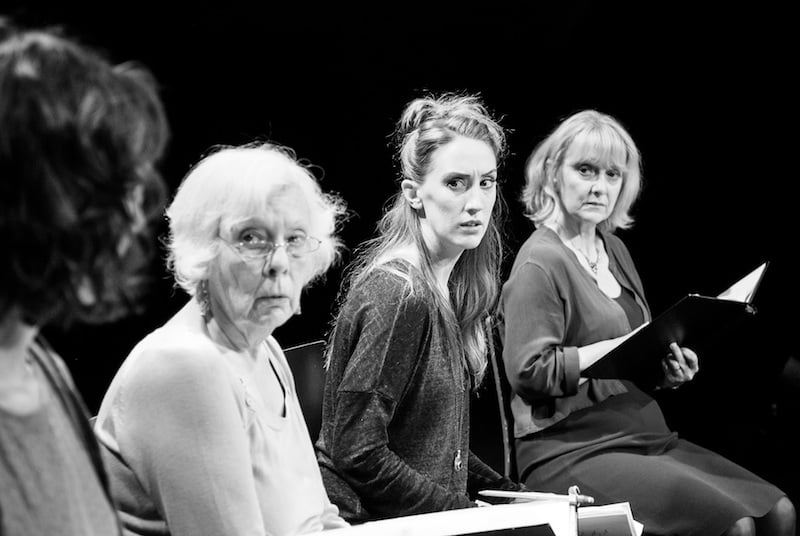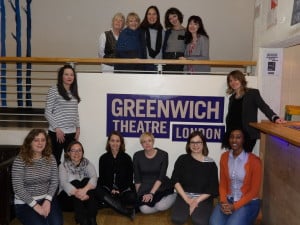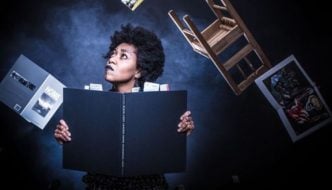
From the moody, teenage years to those amidst a middle-aged crisis, Three Generations of Women is a play that explores female relationships through a single family. After a year of researching the personal stories held close to the heart of women all over the country, award-winning Broken Leg Theatre have worked in conjunction with Greenwich Theatre, a company that aims at nurturing new talent, new companies and new voices, to bring a humorous and heart-warming production to the forefront of British theatre.
Alice Trueman, co-producer and co-writer of the play took time to talk to TSOTA about the production, female empowerment and the powerful, personal stories that inspired Three Generations of Women.
TSOTA: What was the inspiration behind the research project that lead to the Three Generations of Women production?
AT: It was a few years ago now that me and my co-writer and collaborator, Anna Jefferson, were down the pub having a chat. Anna had recently become a mother and we were discussing the different challenges women have faced in the last century and the simultaneous progression, but also regression, when it comes to women’s rights, salaries and social visibility. We wanted to move outside of our own subjectivity and gather as many voices and stories as we could, which we achieved through an Arts Council grant that allowed us to travel up and down the country, developing our research and involving a wide range of women to contribute to the project.
TSOTA: Did you have an idea for a creative production from the outset of your research?
AT: Not really, no. It was essentially about women’s experiences in the UK over the last 100 years so we didn’t have any limitations about what we could explore. We wanted the research to guide the direction we moved in and, naturally, we found certain themes coming to the foreground from our discussion groups and online contributions to our website. In terms of constructing the play, it was a fairly organic process and we were sure from the start that it should be a narrative-led piece. It was an ambitious project and we ended up with such a wealth of material that we really wanted to do justice to the many different types of women we had met, from midwives to mums at a playgroup and even a 102 year-old woman from Leeds who had grown up in a workhouse with her sisters. Our real challenge was taking the extraordinary stories and putting them into a narrative that covered all generations.

TSOTA: Personally, what story resonated with you most while creating this project?
AT: It’s really hard to pinpoint one, there were so many that really do stay with me. I have admiration for the defiance and fight that so many of these women went through. One that really did stay with me, which also managed to creep its way into the play, was about a woman from Ireland who had managed to get away from home in a tiny rowing boat when she was about 15 years old in search for work. She held the responsibility to provide for her family on her shoulders at such a young age. We were exposed to such wonderful and bizarre stories, another lady who worked as a maid in a stately home told us how she fought off a bull!
TSOTA: How did it come about for the play to be set in Leeds?
AT: It was one of the areas that we went to do our research; we met with groups at the West Yorkshire Playhouse, an older women’s group and students at the University of Leeds, which is where I studied. Anna, my co-writer, also grew up not too far from Leeds so it was some common ground that she and I had together. Many of the great stories we found came from this city and it became the best setting for us, which is revealed in the plot of the play itself.
TSOTA: With an all-female crew and cast, were there any difficulties?
AT: In terms of cast, we weren’t against having male characters, and we included some in earlier versions of the play, but it was a creative decision in order for us to portray as wide a breadth of experiences as possible with as few cast members. In terms of the crew, we didn’t set out to make it female-specific but as the production emerged we were inspired as a female team to reflect the very stories of the play. It never felt like a compromise, it was more of a nod to the amazing women who had inspired the whole project and the ease of finding people who fit the project is only testament to the female talent available.
I think any kind of visibility for women, in any arena, is important in terms of addressing the gender balance. In a way we were lucky that we caught a zeitgeist of women’s voices coming to the fore. Campaigns such as No More Page 3 and the Everyday Sexism Project were all gaining momentum at the same time as we began developing the play, which was quite fortuitous; there was just something in the air. It’s nice to be part of that movement, to be able to preserve these hidden stories that haven’t yet found their way into the history books.
TSOTA: What do you hope the audience will take away from watching Three Generations of Women?
AT: It’s always been a priority of Broken Leg Theatre to have solid stories filled with honesty and humour. Research aside, I hope this is going to be a really good story that resonates, not just with women, but with everyone. It’s a chance to gain an insight into the lives of our mothers and grandmothers, and spark inspiration in anyone to keep the spirit of these amazing women alive. The play consists of universal themes that are appropriate for all ages and genders.
I thought about the name of the play, and if it were called Three Generations of Men, would it alienate women? I don’t think it would at all, so the fact that our stories are female stories, it doesn’t mean they can’t be appreciated by all kinds of different people at different stages of life. I certainly don’t see it in any way being limited to a female audience. There is a language of common experience within the play that I hope everyone can take away something from it.
Three Generations of Women comes to Carriageworks Theatre, Leeds, on 10th March.
Filed under: Theatre & Dance
Tagged with: Alice Trueman, Carriageworks theatre, interview, leeds, play, theatre, Three Generations of Women, writer



Comments